If people can’t find you on Google, they probably won’t find you at all.
Think about it… when was the last time you clicked on page 2 of Google when looking for something? Exactly. Almost 95% of people stick to the first page and most of those clicks go to the organic results (no ads!).
That’s why SEO (Search Engine Optimization) is the most brilliant long-term move for your dental practice. It’s not some trendy marketing hack — it’s how you stay booked and busy for years to come.
And don’t worry, this guide isn’t packed with techy stuff you need a marketing degree to understand. I’m breaking it all down for you.
Here’s what I’m going to show you:
- How SEO works (without the confusing terms
- How to get found by people right in your area
- How to set up your Google Business Profile (so you actually show up)
- Easy link-building tips to boost your website
- And how to create content that makes Google (and future patients) love you
Ready to get your practice showing up where it matters most? Let’s dive in.
Why SEO for Dentists Matter in 2025
Most people aren’t walking around asking friends for dentist recommendations anymore. They’re going straight to Google. In fact, about 90% of patients start their search online.
And if your dental practice isn’t showing up on page one? You’re probably losing out on a ton of new patients.
This is why SEO for dentists is such a game-changer. It helps your website show up right when people in your area are searching for things like “dentist near me” or “best dental clinic.”
And get this, the keyword “dentist near me” alone has a total search volume of thousands of searches!
Check this out:
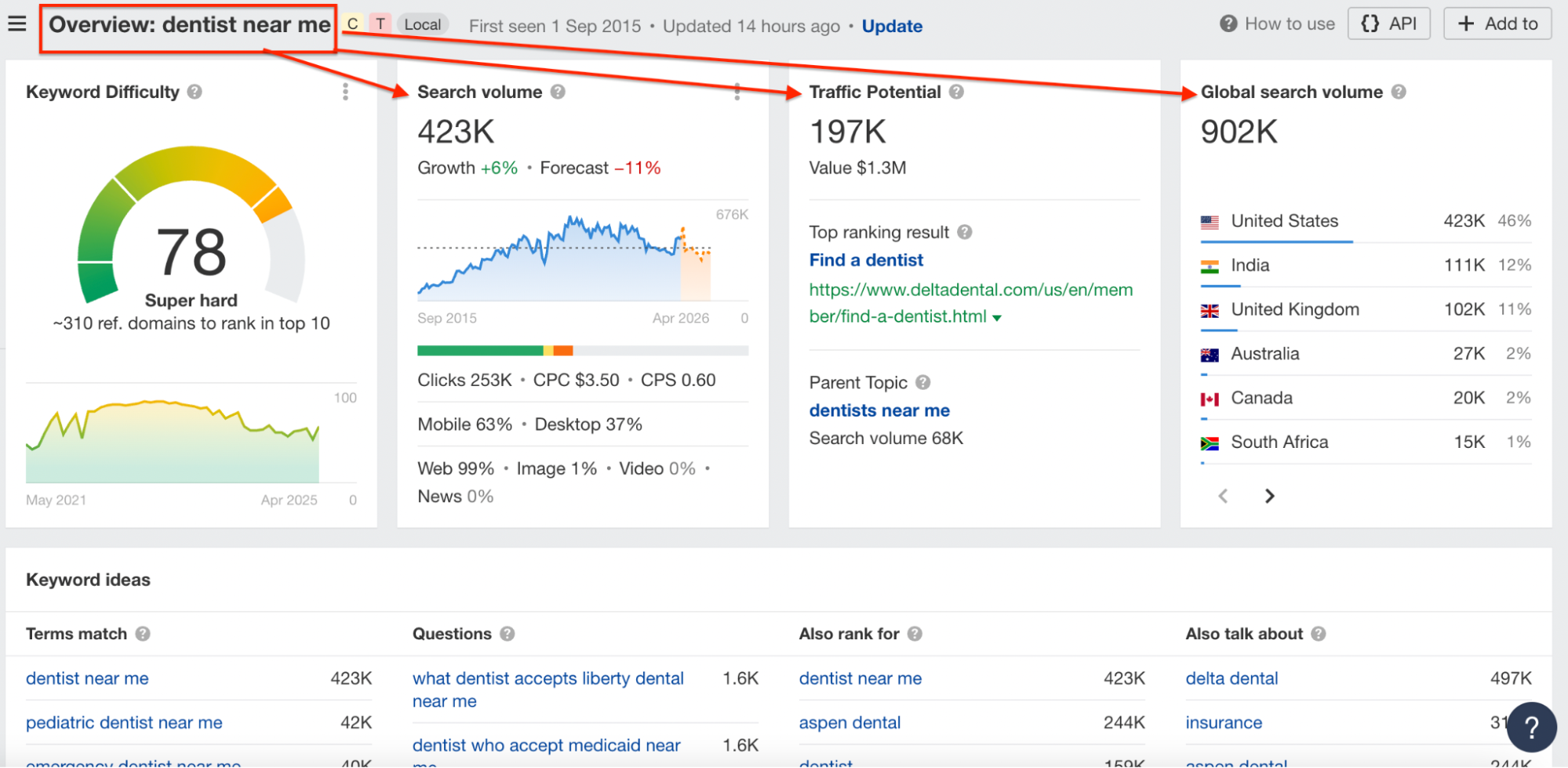
That’s 423,000 searches every month in the United States, and globally, that number reaches 902,000 searches. It’s one of the most competitive keywords in the dental industry, with a difficulty score of 78, meaning it takes around 310 referring domains to rank in the top 10 results.
Most of this search traffic comes from mobile users (63%), showing how important local SEO is for dental practices. The traffic potential for ranking with this keyword is estimated at 197,000 monthly visits, valued at $1.3 million.
People are also searching for related terms like “pediatric dentist near me” and “emergency dentist near me,” proving how valuable it is to optimize for multiple keyword variations if you want to attract more patients online.
Benefits of SEO for Dentists

If your dental practice isn’t showing up on Google, you’re losing patients every single day, and it’s not a myth; it’s a real scenario.
That’s why investing in SEO for dentists isn’t just smart, it’s necessary. A solid dental SEO strategy helps people in your area find you fast when they’re searching for services like teeth cleaning, implants, or emergency care.
Here’s how search engine optimization makes a huge difference for dentists:
1. Get More High-Intent Local Leads
People searching “dentist near me” or “family dentist in [city]” are ready to book an appointment now and not later. With local dental SEO, your dental website shows up exactly when they need you most.
This is the heart of dental search engine optimization, connecting your dental practice with people actively searching for your services on search engines.
2. Build Trust & Credibility Online
Showing up in the top search engine rankings tells people you’re a trusted expert. Plus, a professional dental website with great reviews builds instant trust before a patient even walks through your door.
It’s simple. The better your dental website SEO, the more credible you’ll look online.
3. Dominate Your Local Search Results
When you invest in dental SEO services, you’re not just aiming for random traffic — you’re targeting local SEO for dental.
That means appearing in your city’s Google Map Pack, organic search results, and even voice searches (like “Hey Google, find a dentist near me”).
With a fully optimized Google Business Profile, your dental practice can own your area online.
4. Increase Calls & Booked Appointments
At the end of the day, the goal of search engine optimization isn’t just rankings, it’s results.
More visibility online leads to more website clicks. More clicks lead to more phone calls. And more calls mean more new patients in your chair.
That’s the power of a well-executed dental SEO strategy.
5. Boost Your Brand Authority with Editorial Mentions
Want to stand out even more? Securing features in affiliate editorial reviews or local publications can give your dental practice major authority online.
These trusted mentions signal to search engines (and potential patients) that your dental website is credible and worth visiting.
Bottom line? Dental SEO isn’t just about getting found, it’s about becoming the go-to dentist in your local community.
It’s a long-term strategy that keeps working for you. 24/7 bringing in patients, building trust, and helping your practice grow year after year.
How to Do Keyword Research for Dental SEO
Before you can rank on Google, you need to know exactly what your future patients are searching for. And no guessing won’t cut it.
This is where keyword research comes in.
Keyword research is the process of finding the search terms people use when they’re looking for a dental practice, whether it’s through Google Maps (also called the local pack or 3-pack) or the regular search engine results pages.
The goal? To make sure your Google Business Profile shows up in local searches and your website ranks in the organic results. This strategy works for both organic dentist SEO and Google Ads, so you cover all your bases.
Why Keyword Research Matters in Dental SEO Marketing
A smart dental SEO marketing strategy isn’t just about ranking in one spot; it’s about dominating the entire page.
That means:
Ranking #1 in Google Ads (at the very top)

Ranking #1 in the Local Pack (Google Maps)
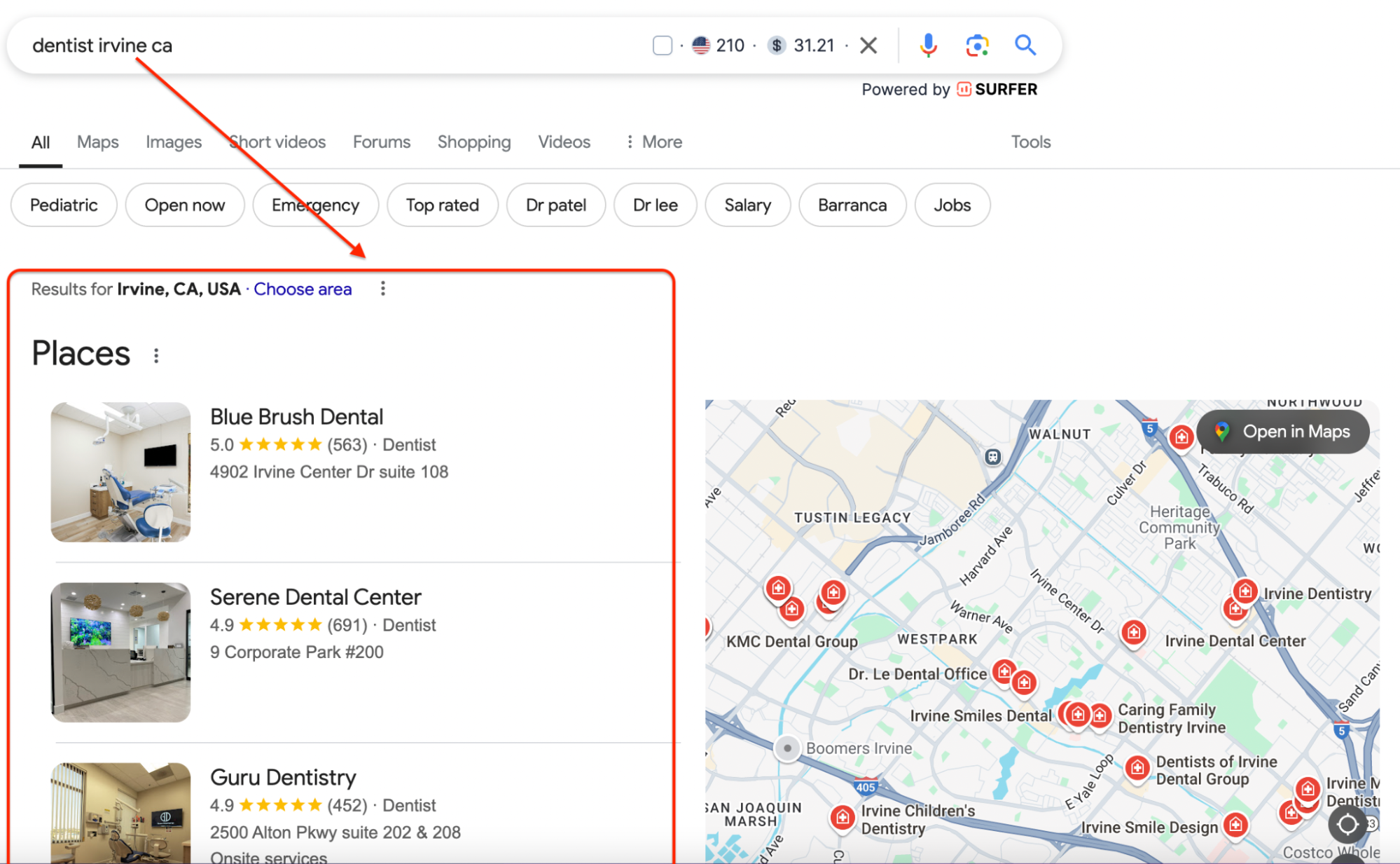
Ranking #1 in the organic search engine results pages (traditional search results)

When you appear everywhere your patients are searching, you’ll get the most clicks, calls, and website traffic, leaving your competitors in the dust.
Focus on Ranking in the Top 3
Keep in mind that ranking on just the first page of Google isn’t enough anymore.
With so many ads, maps, and featured snippets, clicks are consumed before people reach the bottom of the page.
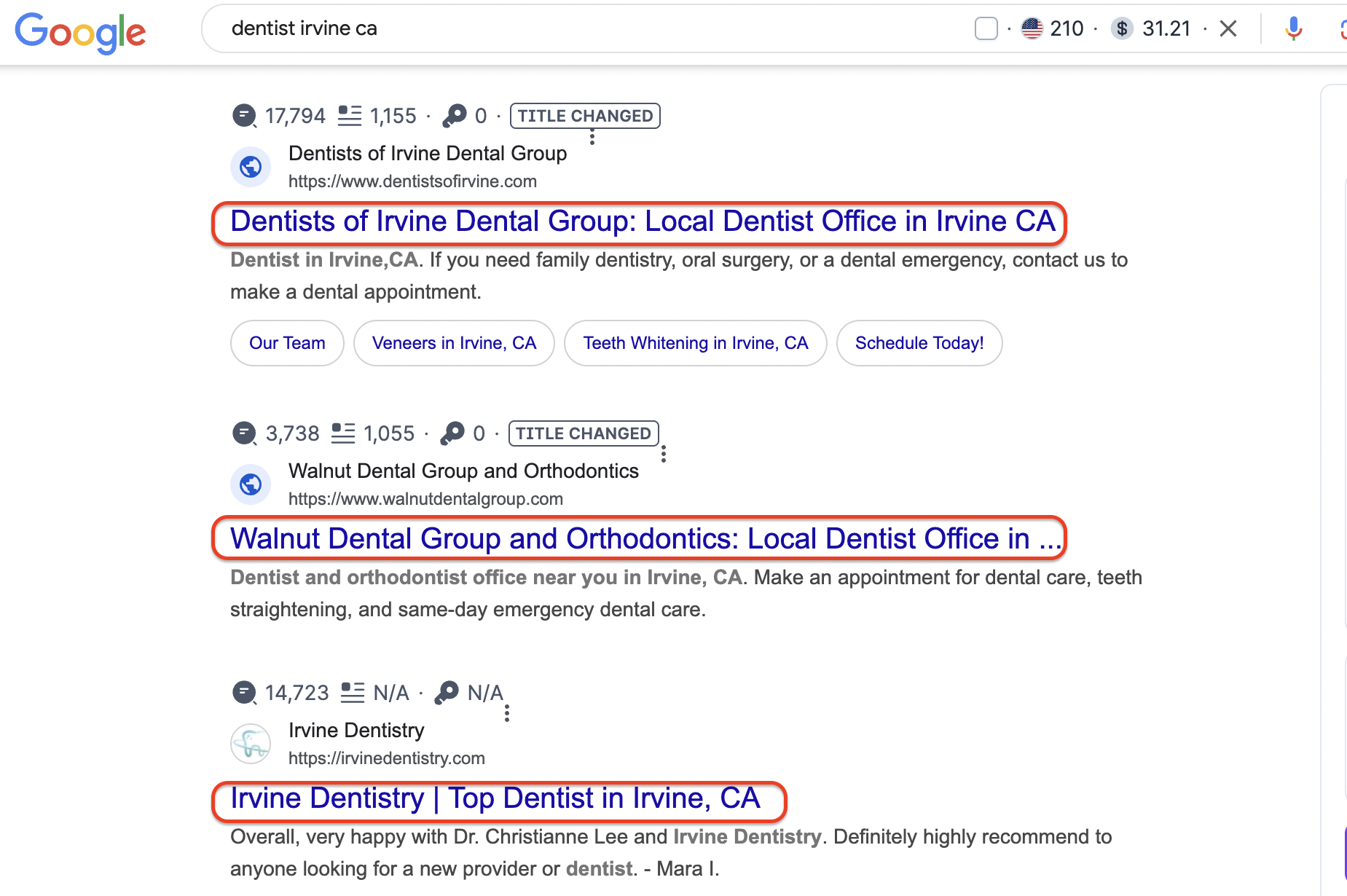
That’s why a solid local SEO strategy for dentists should focus on getting your dental practice into the top 3 results, especially in the local pack and organic search.
This is where most of the action happens.
How to Perform Keyword Research for Your Dental Website
The good news? You don’t have to figure this out on your own. There are powerful SEO tools that make keyword research easy and accurate.
Some of the best tools for dentist SEO include:
- Semrush
- Ahrefs
- Google Keyword Planner
In my case, my favorite tool is Ahrefs because it gives us a comprehensive overview of everything we need to rank in Google.
Here’s a quick way to start:
Open Ahrefs, then go to the Keyword Explorer and enter a broad phrase like “dentist [YOUR CITY], for example:

From there, you’ll get a list of real keywords people in your area are searching for including specific services like:

- “Best dentist in Irvine, CA”
- “Emergency dentist Irvine C”
- “Dentist Consulting”
Target Keywords with Commercial Intent
Not every keyword is worth targeting.
You want to focus on commercial intent search terms that show people are ready to book an appointment.

Building your local SEO strategy around commercial keywords will give you the best ROI, as these are the searches that lead to real patients.
Pro Tip: Keyword research is the foundation of every successful dental SEO marketing campaign.
Once you know what people are searching for and what their intent is, you can create content, optimize your site, and dominate the search engine results pages.
On-Page SEO for Dentists
If keyword research tells you what people are searching for, on-page SEO tells Google where to find it on your site.
This is the part where your dental practice’s website needs to shine — and trust me, even small tweaks can make a big difference in your online visibility.
Most dental SEO experts and dental SEO companies agree that a well-structured site is the foundation of a strong SEO strategy. It helps search engines like Google understand your services, location, and why you deserve to be on the first page of the search results.
Here’s how to set up your dental website the right way:
1. Organize Your Website Structure

Your website structure is like the floor plan of your dental office. Everything should be easy to find.
Patients (and Google) should be able to quickly navigate through your services, locations, and contact info.
A clear structure means:
- H1 Tag for your main page title (like “Trusted Family Dentist in [City]”)
- H2 & H3 for your services or FAQs
- Clean URLs (like /teeth-cleaning-los-angeles/)
This setup helps boost your online visibility and guides dental patients to the right page fast, which Google loves.
2. Optimize Title Tags, Meta Descriptions, and Headers

These elements are what show up in the search engine results when someone looks for your services online.
Make sure your SEO strategy includes the following:
- Title tags with your target keyword (under 60 characters) if the charactersare exceeded, trim the sentences down.
- Meta descriptions that encourage clicks
- Headers that include location-based and service keywords
This signals to search engines that your dental practice’s website is relevant, helpful, and worth ranking in the top search results.
3. Use Internal Linking Smartly
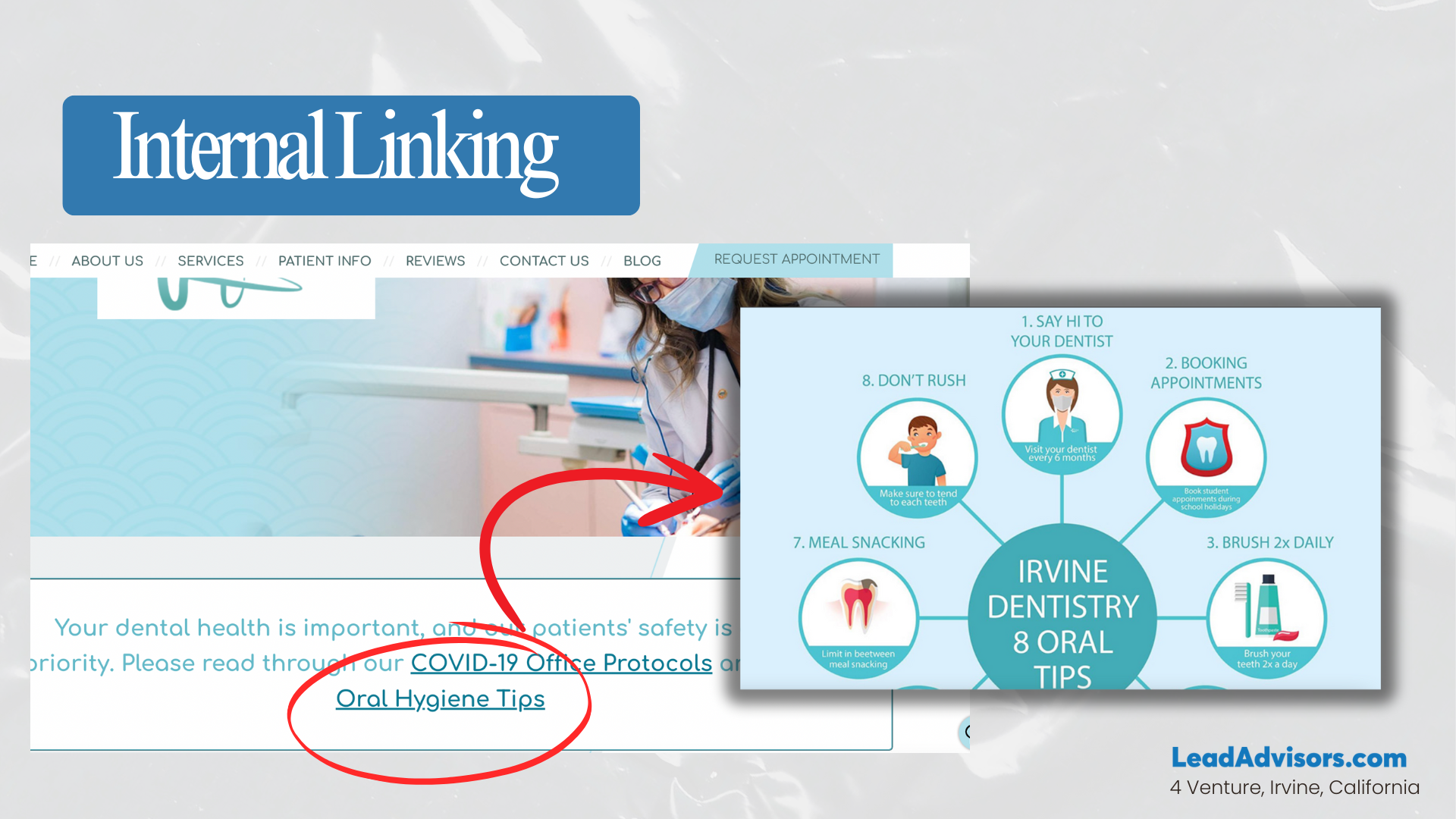
Internal links help visitors, and Google move through your site easily.
For example: On your homepage, you should link to your individual service pages like:
- “Teeth Whitening in [City]”
- “Dental Implants in [City]”
This strengthens your website structure and spreads SEO value across your entire site and improving your search engine results positioning.
4. Create Geo-Targeted Service Pages
This is where a dental SEO specialist or dental SEO company can really help you stand out.
Instead of one generic “Services” page, create a dedicated page for each service and location you offer.
For example:
- /cosmetic-dentist-los-angeles/
- /emergency-dental-care-los-angeles/
This type of targeted SEO strategy helps you rank higher for local searches — bringing in more dental patients who are ready to book an appointment.
Pro Tip: Your dental practice’s website isn’t just about looking good it needs to work for you in terms of search results.
If you’re unsure where to start, working with a dental SEO company or an experienced web developer can help you create a site that’s not only patient-friendly but fully optimized for search engines.
Local SEO for Dentists: Ranking in Your City
Most people who search for a dentist don’t look nationwide. They look for someone right in their neighborhood.
That’s why Local SEO is a must-have in your dental SEO strategy. It’s all about making sure your dental practice shows up when people search for things like:
- “Best dentist near me”
- “Pediatric dentist in [your city]”
- “Emergency dentist open now [city]”
Here’s how to boost your online visibility and dominate the local search engine results:
Google Business Profile Optimization
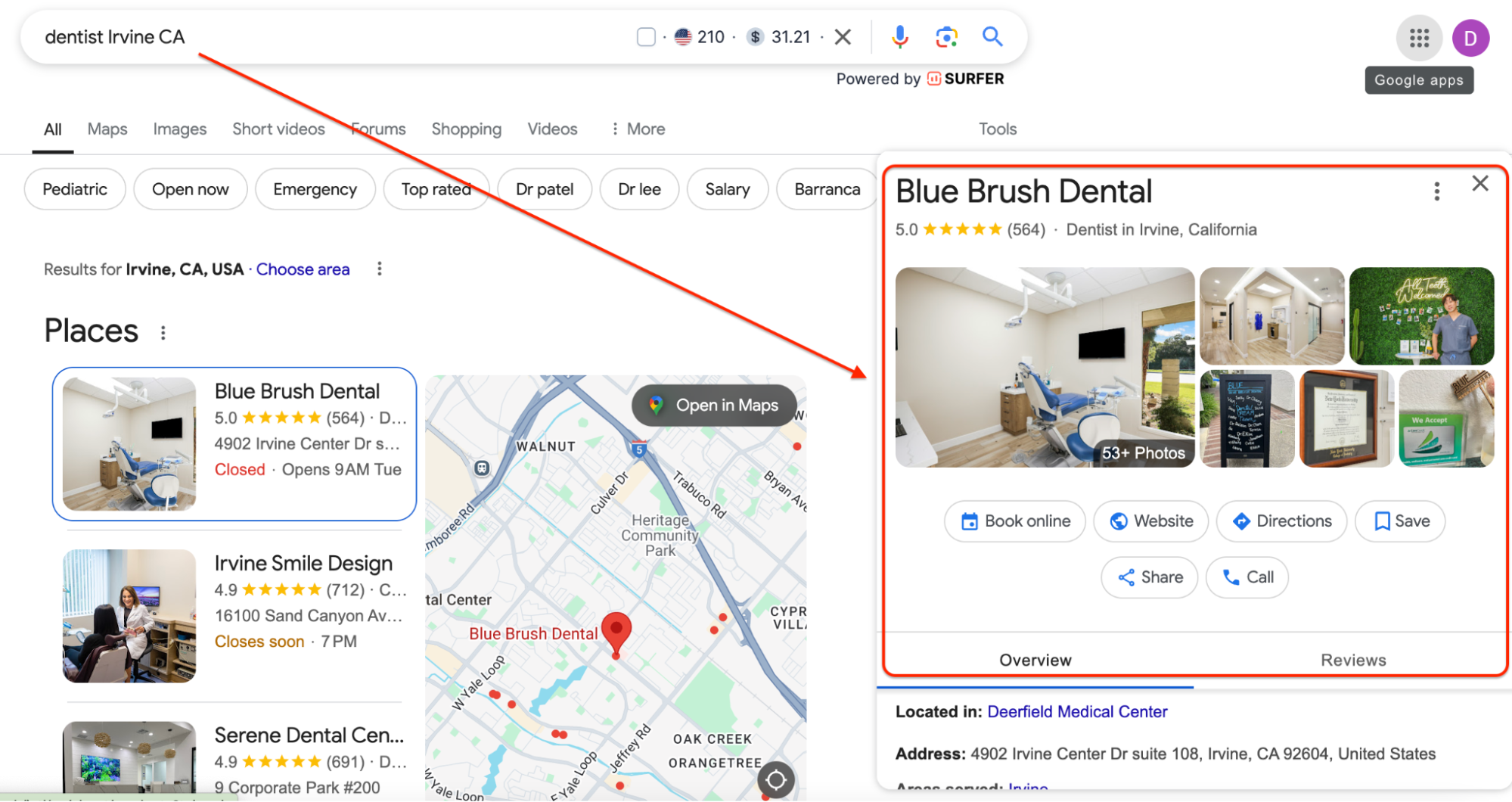
Your Google Business Profile (GBP) is your MVP when it comes to local SEO.
Here’s what every dental SEO specialist would tell you to do first:
- Claim your listing on Google
- Add your dental services, office photos, contact details, and business hours.
- Post regular updates (like promos, tips, or holiday hours)
- Ask happy dental patients to leave reviews — and always respond to the.
A well-optimized GBP helps you appear in the map pack, one of the hottest spots in search engine results.
Local Listings & Citations
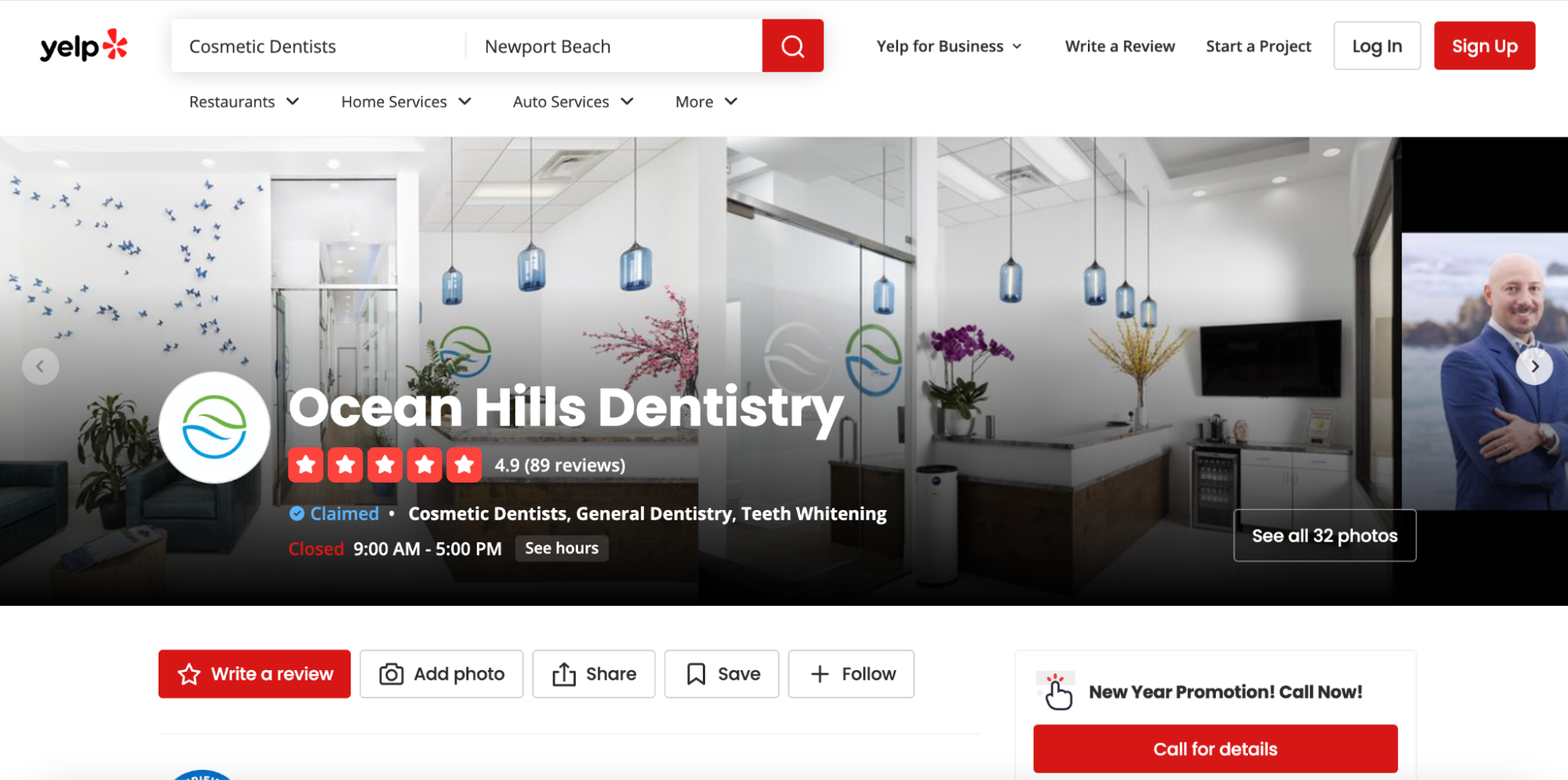
Next, you need to make sure your dental practice’s website is listed accurately across significant directories.
This is called building local citations, and it’s a key step in any strong local SEO game plan.
Make sure your NAP (Name, Address, Phone Number) is consistent everywhere. No typos. No old numbers.
Some important sites to submit your practice to:
- Yelp
- Healthgrades
- Angi
- Bing Places
- Local dental directories in your city
Consistency here sends trust signals to search engines and improves your local search results rankings.
Boost Local Authority with Editorial Listicles
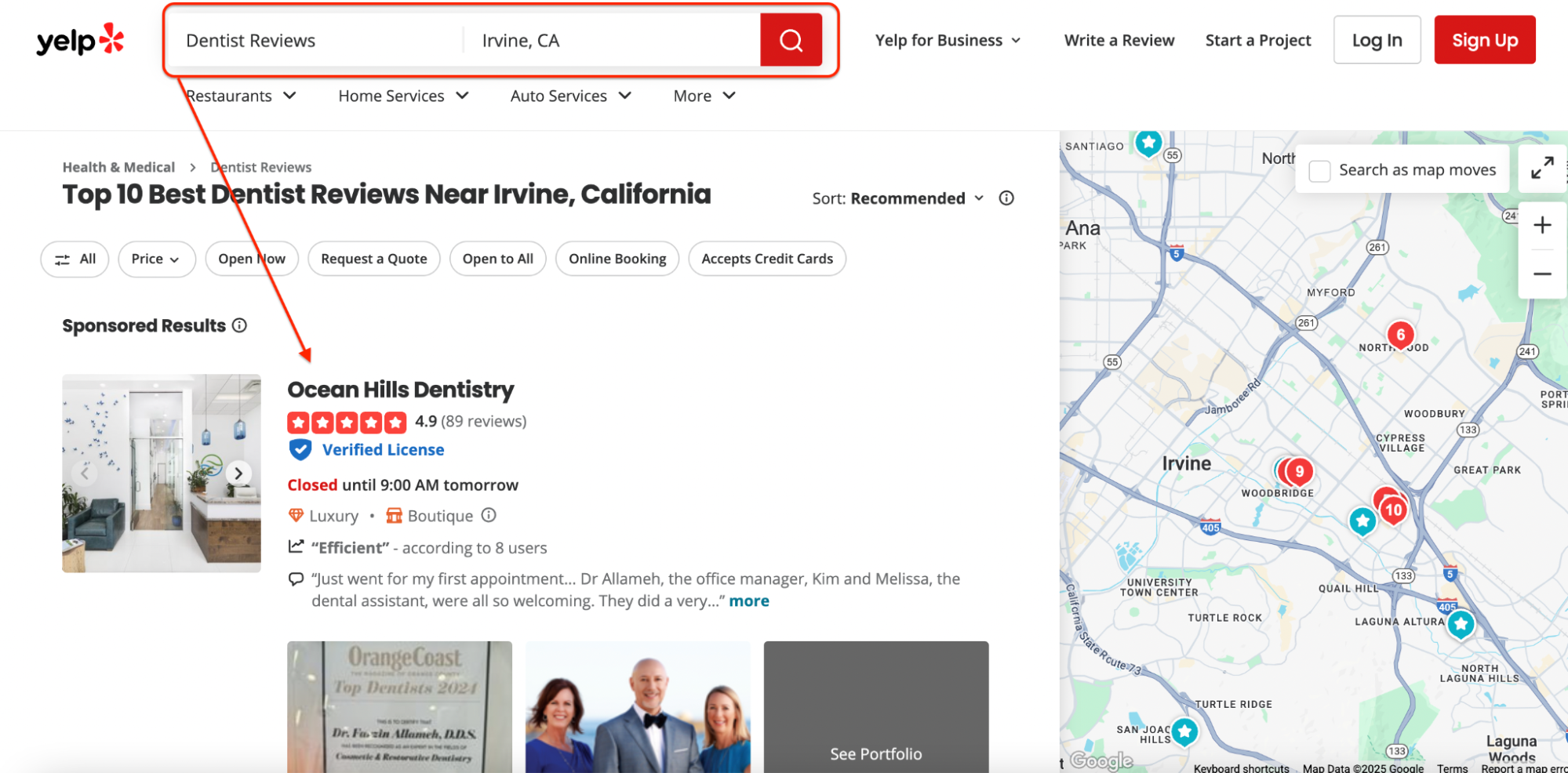
Want to take your local SEO to the next level?
Getting featured in “Top 10 Dentists in [City]” lists or “Best Cosmetic Dentists Near Me” articles is a game-changer.
These are called affiliate editorial reviews are curated listicles published on high-authority sites like Inquirer.net, MSN, or Yelp.
And no, they’re not ads. They’re trusted content pieces that boost Google trust, increase online visibility, and drive qualified traffic straight to your dental website.
Benefits of Editorial Mentions for Dental SEO
- Helps you rank for competitive terms like “best dentist in [City].”
- Builds local trust and authority
- Drives warm traffic — people actively searching for dental services
- Enhances your reputation in a competitive dental industry
Remember: Local SEO isn’t just about being online , t’s about being everywhere your local patients are searching.
Combine a fully optimized Google Business Profile, accurate local citations, and trusted editorial features — and your dental SEO strategy will put your practice front and center in the search engine results.
Blogging & Content Marketing for Dental SEO
If you think blogging is just for lifestyle influencers — think again. Blogging is one of the most powerful tools in any dental SEO strategy.
Here’s why: Google loves fresh, helpful content. And your future dental patients are already searching for answers online.
Creating blog posts that answer their questions not only helps with search engine rankings, but also builds trust with people before they even call your office.
Why Blog Content Matters for SEO & E-E-A-T
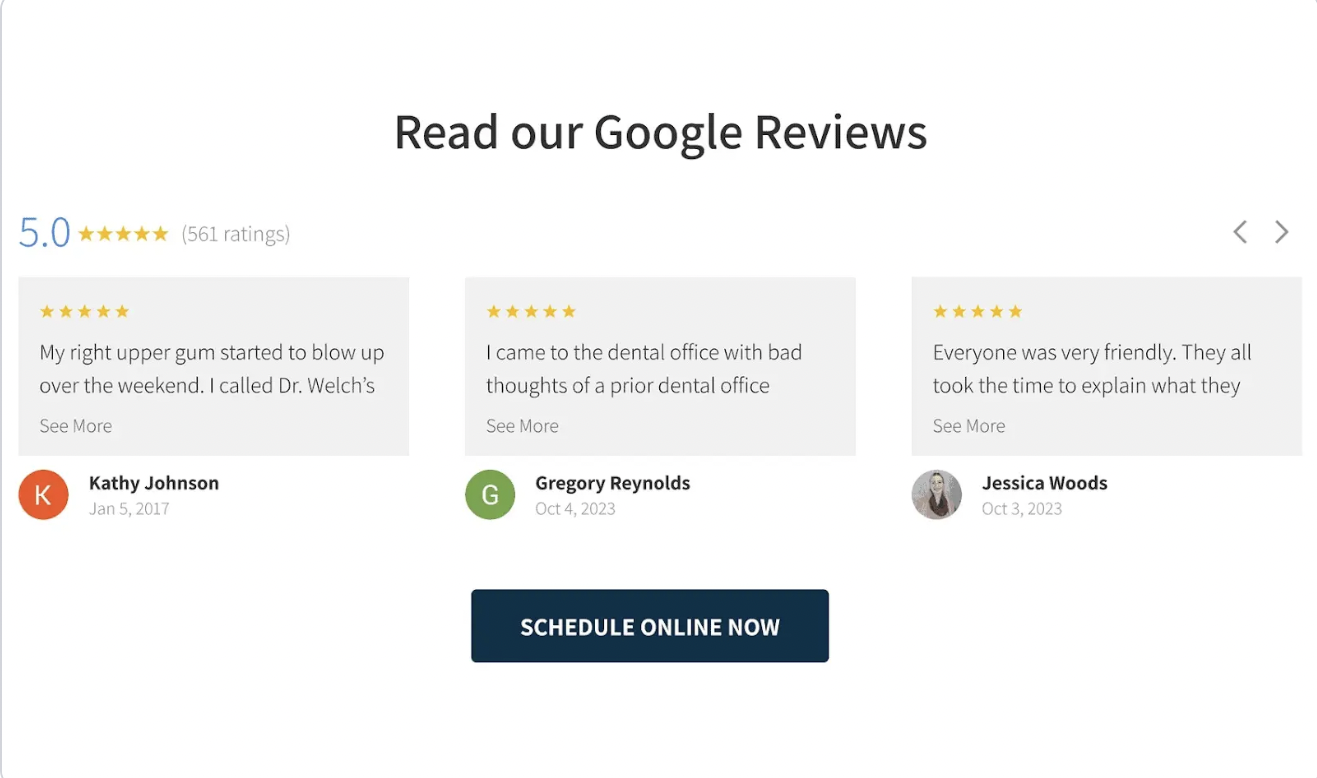
E-E-A-T stands for Experience, Expertise, Authoritativeness, and Trustworthiness.
Google uses this framework to evaluate the quality of your content, especially in the dental industry, where accuracy and credibility matter.
That’s why blogging isn’t just good for your audience, it’s good for SEO.
Regular blog posts improve your dental practice’s website by:
- Driving more traffic from search engines
- Increasing your online visibility
- Helping your site rank for service-related and local keywords
- Building trust with both Google and dental patients
Blog Ideas for Dental SEO Marketing
Not sure what to write about? Focus on topics your local audience is already searching for:
- “Dental implants cost in [City].”
- “What to do if you chip a tooth in [City.]”
- “How often should you get a dental cleaning in [Cit?y]”
- “Best teeth whitening options in [City]”
These types of blog posts attract traffic with local SEO power, bringing more people to your dental website and helping you rank higher in the search results.
Add Evergreen Editorial Content to Your Strategy
Blogging on your own site is great, but adding evergreen content on high-authority platforms takes your dental SEO marketing to the next level.
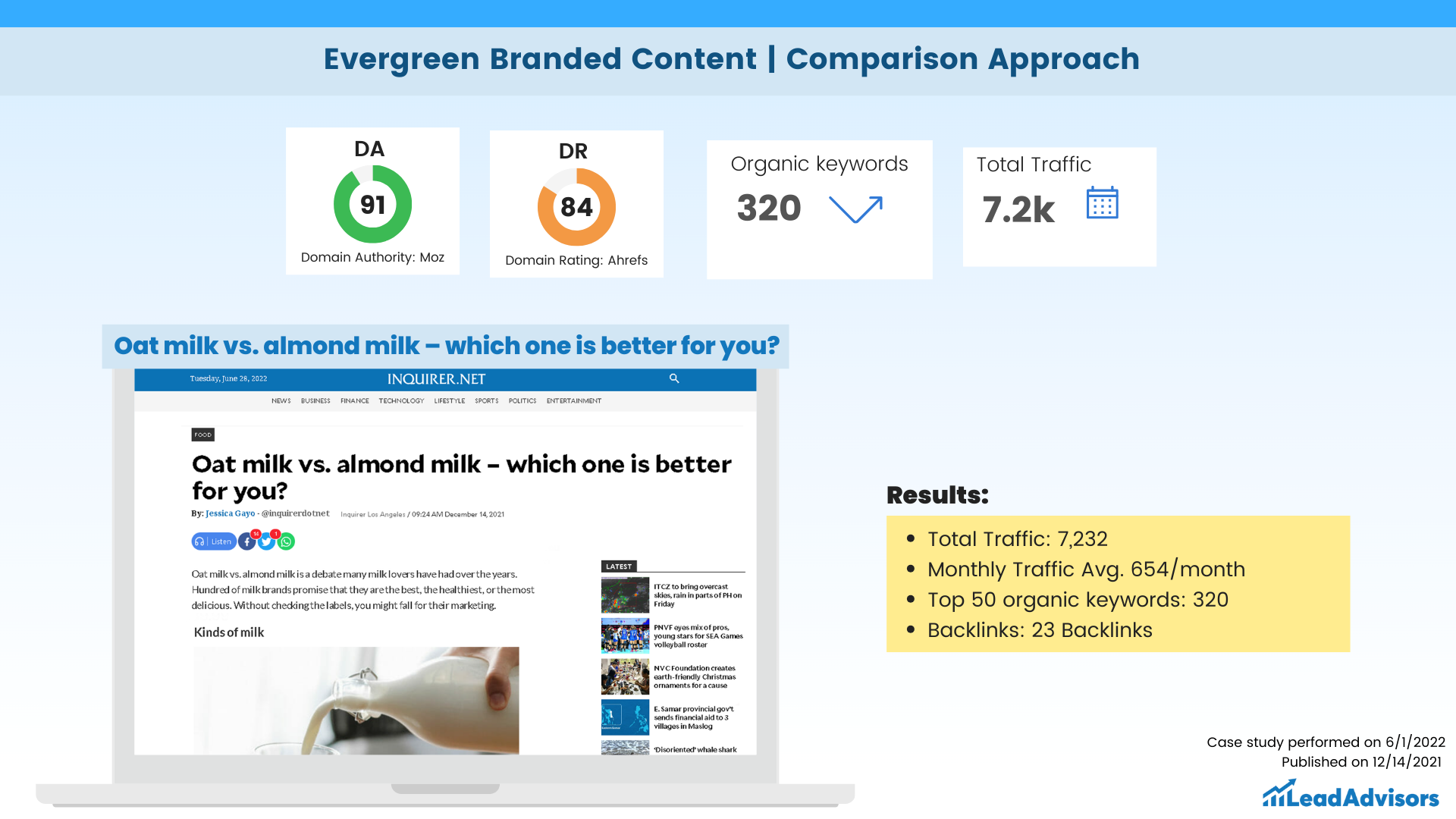
These affiliate editorial reviews and expert-written guides aren’t ads, they’re trusted resources that live on reputable third-party platforms like MSN, Inquirer.net, or Healthline.
And the best part? They keep working for you long-term.
Example of Evergreen Editorial Content

“12 Trendy Summer Nails to Try in 2022” published on a trusted site with a backlink to your dental practice’s website.
This kind of content drives lasting SEO value by:
- Helping you rank for competitive keywords
- Boosting your search engine rankings
- Driving ongoing traffic to your site
- Building instant trust with new patients
Pro Tip: Combine local blogging with evergreen editorial content for a well-rounded SEO strategy.
You’ll rank better, attract more dental patients, and stay visible across multiple search engine results pages, without always having to create content on your own blog.
Technical SEO for Dentists
You could have the most beautiful dental practice website, but if it’s slow, hard to use, or not mobile-friendly, Google won’t rank it high in the search results.
That’s where Technical SEO comes in.
Think of it as the behind-the-scenes work that makes your dental website easy for both patients and search engines to navigate. It’s one of those things every dental SEO company or web developer will tell you not to skip.
Here’s what matters most when it comes to Technical SEO for dentists:
1. Mobile-First Design
Most dental patients are searching on their phones, often when they need help fast.
Your site needs to look great and load quickly on mobile devices. A mobile-friendly design is now a ranking factor in Google’s search engine results.
Bonus tip? Make sure your click-to-call button is easy to find. The easier it is for patients to call, the faster they book an appointment.
2. Page Speed & Core Web Vitals

Nobody waits for a slow site to load, especially when they’re in pain or need a dentist quickly.
Google’s Core Web Vitals measure how fast and stable your site is for users.
Fast loading times = Better search engine rankings.
Make sure your dental website is optimized for speed by:
- Compressing images
- Using clean code
- Leveraging browser caching
A dental SEO expert or experienced web developer can easily help with this if you’re not sure how.
3. Schema Markup
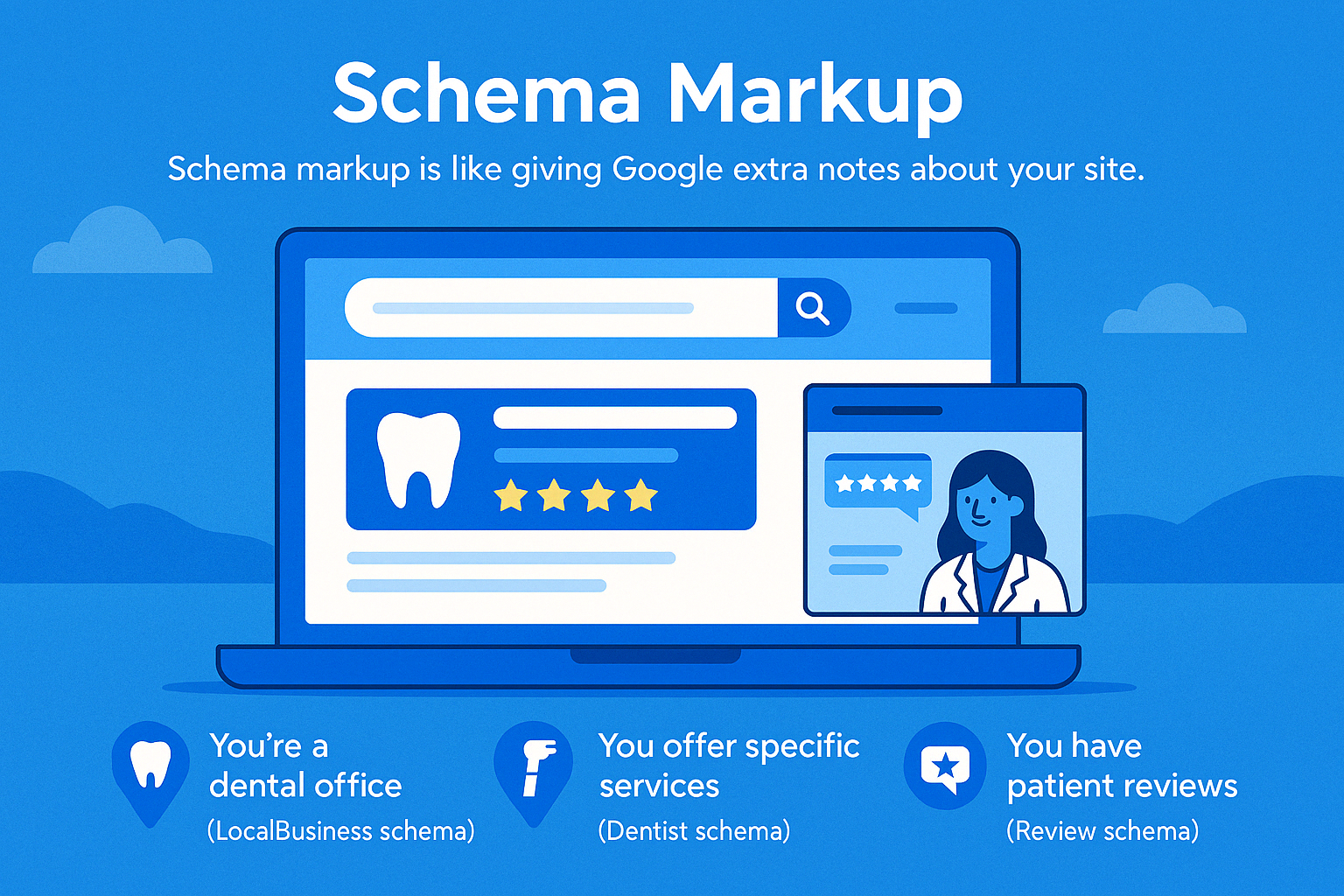
Schema markup is like giving Google extra notes about your site.
For dentists, this means adding code that tells search engines:
- You’re a dental office (LocalBusiness schema)
- You offer specific services (Dentist schema)
- You have patient reviews (Review schema)
Schema markup helps your site stand out in the search results with rich snippets like star ratings or FAQs, making it more likely people will click on your listing.
4. Secure Site (HTTPS)
Security isn’t optional anymore.
Google prioritizes secure sites (using HTTPS) in its search engine results.
If your dental practice’s website still shows up as “Not Secure,” it’s time to get that fixed ASAP.
It’s a trust factor for patients and a ranking factor for search engines.
Remember: Technical SEO might sound intimidating, but it’s essential for maximizing your online visibility and ensuring that your dental SEO strategy delivers real results. Whether you DIY it or hire a dental SEO company, taking care of these technical details helps your site perform better, rank higher, and convert more visitors into loyal dental patients.
Link Building for Dental SEO
Link building is non-negotiable if you want your dental website to rank higher and stay ahead of your competitors.
Think of backlinks as “votes of confidence” from other websites. The more quality links you have pointing to your dental practice’s website, the more Google trusts you in the search results.
But here’s the catch: not all links are created equal.
That’s why smart dental SEO experts focus on getting high-quality links from trusted, relevant sources, not just random directories or spammy websites.
Best Link Building Strategies for Dentists

A solid link-building approach for dental SEO includes:
- Writing guest posts on industry-related sites
- Submitting your dental practice to trusted online directories (like Yelp, Healthgrades, and local chambers of commerce)
- Local PR or news mentions about your practice.
- Sponsoring local events, sports teams, or community activities (which often come with a backlink)
- Partnering with local businesses for content collaborations
All of these strategies help build trust with search engines while driving real traffic to your site.
Affiliate Editorial Content as High-Quality Backlinks

Want to take your dental SEO strategy to the next level?
Getting featured in affiliate editorial reviews and high-authority articles is one of the most powerful link-building strategies.
These aren’t basic directory links and they’re curated articles on reputable platforms like Inquirer.net, MSN, or Yahoo featuring the “Top Dentists in [Your City]” or expert dental guides.
Why These Backlinks Matter for Dental SEO
- Boosts your Domain Authority (DA) — a key metric for search engine rankings
- Helps your homepage and service pages rank higher
- Drives referral traffic that’s more likely to convert into dental patients
- Way more sustainable and valuable than low-quality link swaps
Companies like LeadAdvisors specialize in securing these strategic editorial placements, combining the SEO benefits of trusted backlinks with conversion-focused exposure.
These placements aren’t just for ranking. They build credibility, drive traffic, and help your dental practice become a trusted name in your local area.
Reputation Management & Patient Trust
Let’s face it, in the dental industry, trust is everything.
People don’t just choose a dentist based on location. They choose based on online reviews, personal recommendations, and how comfortable they feel with your dental practice.
That’s why reputation management is a crucial part of any successful dental SEO strategy.
Google doesn’t just rank your dental website based on keywords; it looks at what people are saying about you online.

Key Ways to Manage Your Online Reputation
- Encourage Patients to Leave Reviews
Ask happy dental patients to leave reviews on platforms like:
- Healthgrades
- Yelp
The more positive reviews you have, the more likely new patients are to trust you and Google’s algorithm will notice, too.
Editorial Mentions as Trust Builders
Want to level up your credibility even more?
Being featured in affiliate editorial reviews or trusted listicles is like getting a third-party endorsement, and that’s a huge trust signal for Google and potential patients.
These aren’t ads—they’re expert-curated articles on high-authority platforms that position your dental practice as the go-to in your city.
Example Editorial Mentions:
- “Dr. Smith Featured in Guide to Best Cosmetic Dentists in LA”
- “Top Practices for Invisalign in 2025 – Published on Inquirer.net”
These editorial features validate your expertise before a patient even sees your Google rating.
Trust = Conversions
At the end of the day, people want to book with a dentist they trust.
When new patients see your dental practice recommended by credible, well-known sources, that trust builds instantly.
It’s one of the most powerful ways to stand out in a competitive dental industry, driving more bookings and long-term loyalty.
Social Media’s Role in SEO for Dentists

Let’s clear something up — social media doesn’t directly impact your search engine rankings.
That’s right. Google doesn’t use your Instagram likes or Facebook followers as a ranking factor.
BUT… social media still plays a big role in supporting your dental SEO strategy.
Why? Because it helps build online visibility, keeps your dental practice top of mind, and drives more traffic to your dental website — which can indirectly improve your SEO.
Here’s How Social Media Supports Dental SEO Marketing
1. Promotes Your Blog Content & Service Pages
When you post helpful blogs like “Dental Implants Cost in [City]” or “What To Do If You Chip a Tooth in [City]” on social media, you’re driving more clicks to your dental website.
More traffic means more chances for people to stay on your site, explore your services, and maybe even share your content, which can lead to backlinks (a huge SEO win).
2. Amplifies Your Google Business Profile (GBP) Updates
You can also share your latest Google Business Profile posts, office updates, and patient reviews on your social media pages.
This keeps your followers engaged and reminds Google that your dental practice is active, trusted, and local.
3. Increases User Engagement & Brand Mentions
Social media helps build brand recognition in your community.
The more people engage with your content, leave reviews, or mention your practice online,the stronger your online visibility becomes.
This can lead to more natural backlinks, which dental SEO experts know are key for improving search engine results.
While social media might not directly boost your search engine rankings, it absolutely supports your dental SEO marketing strategy by:
- Driving more traffic to your site
- Increasing engagement with your content
- Amplifying your reviews and GBP posts
- Creating backlink opportunities over time
Analytics & Tracking for Dental SEO Success
Doing dental SEO without tracking your results is like treating a patient without an X-ray. You need to see what’s working (and what’s not) so you can adjust your strategy.
This is where analytics and tracking come in.
Using free tools like Google Analytics, Google Search Console, and Google Business Profile (GBP) Insights gives you clear data on how your dental practice’s website is performing in the search results.
Essential Tools for Dental SEO Tracking

Here’s your basic dental SEO strategy tracking toolkit:
- Google Analytics — Tracks your website traffic, visitor behavior, and conversions
- Google Search Console — This shows you which keywords you’re ranking for and any SEO issues.
- Google Business Profile (GBP) Insights — Tracks how people find and interact with your business on Google Maps
These tools are a must-have for any dental SEO company or dental SEO expert managing your site.
What Metrics Should You Track?
Here’s what every dental practice should keep an eye on:
1. Organic Traffic
How many people are visiting your site from search engines like Google? Growth in organic traffic means your SEO strategy is working.
2. Keywords
Which keywords are driving the most traffic to your site? Are you ranking for local search terms like “best dentist in [city]” or “dental implants near me”
Tracking keywords helps refine your content and stay ahead of local competitors.
3. Calls + Form Fills
How many patients are calling directly from your dental website or submitting contact forms? This is where SEO meets real results — turning website visitors into booked appointments.
4. GBP Actions
Your Google Business Profile shows key engagement data like:
- Website clicks
- Calls from your profile
- Direction requests
- Review views
These actions show how effective your local SEO efforts are in driving patient interaction.
DIY vs. Hiring an SEO Agency for Dentists
So you might be wondering… “Should I handle dental SEO myself or hire a dental SEO company to do it for me?”
Great question and the honest answer is: It depends on your time, skills, and goals.
Let’s break it down:
When DIY Dental SEO Makes Sense
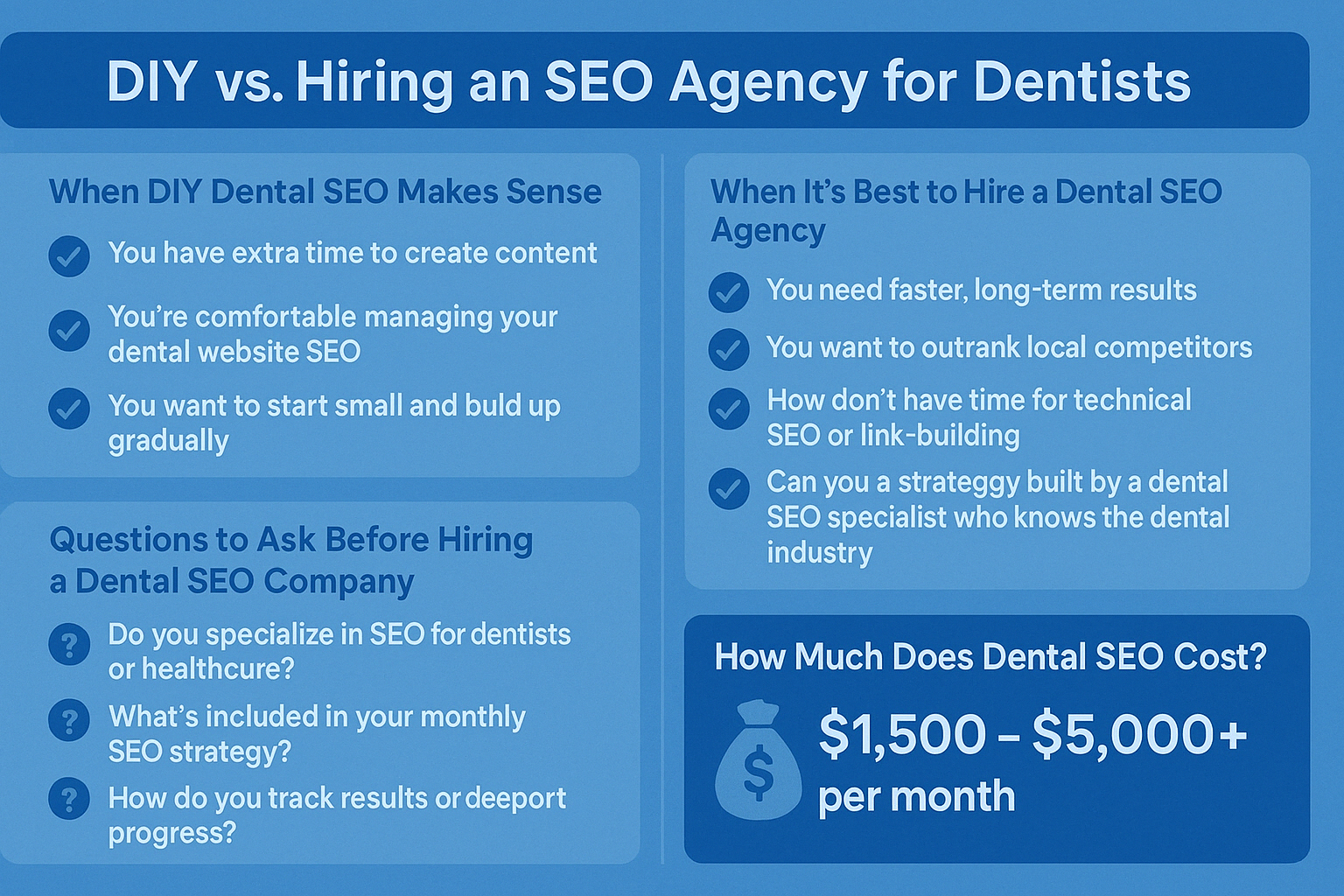
If you’re a hands-on dentist or practice owner who loves learning new things (and doesn’t mind getting a little technical), DIY dental SEO marketing could work for you.
There are tons of free tools and resources to guide you, plus, if you’ve got a web developer on your team, that’s a huge plus.
DIY is a good fit if:
- You have extra time to create content
- You’re comfortable managing your dental website SEO.
- You want to start small and build up gradually.
When It’s Best to Hire a Dental SEO Agency
Most dental practices are busy focusing on what they do best: treating patients.
If that sounds like you (aka: you don’t have time to blog, build links, or update your Google Business Profile every week), hiring a trusted dental SEO expert or agency is a smart investment.
Hiring an SEO agency makes sense if:
- You need faster, long-term results
- You want to outrank local competitors.
- You don’t have time for technical SEO or link-building.
- You want a strategy built by a dental SEO specialist who knows the dental industry
Questions to Ask Before Hiring a Dental SEO Company
Not all agencies are created equal, so here’s what to ask before you sign anything:
- Do you specialize in SEO for dentists or healthcare?
- What’s included in your monthly SEO strategy?
- How do you track results and report progress?
- Can you show client success stories or case studies?
- What’s your approach to local SEO and content marketing?
A good dental SEO company should provide clear communication, regular reporting, and a custom strategy tailored to your dental practice’s website.
How Much Does SEO for Dentists Cost?
Typical monthly investment for quality dental SEO services ranges from:
$1,500 – $5,000+ per month
This depends on the size of your practice, your location, your competition, and how aggressive you want your SEO strategy to be.
Remember, SEO is a long-term investment that pays off over time with higher search engine rankings, increased online visibility, and more dental patients booking appointments every month.
Common Dental SEO Mistakes (And How to Avoid Them)
Let’s be real, even the best dental practices can make mistakes when it comes to SEO. And sometimes, it’s not about doing more. It’s about avoiding the wrong things.
If you’re investing time (or money) into your dental SEO strategy, you want to make sure you’re doing it right.
Here are the most common dental SEO mistakes we see and how you can avoid them:
1. Not Optimizing for Mobile
Most dental patients search for a dentist on their phones especially when they need help fast.
If your dental website isn’t mobile-friendly, loads slowly, or is hard to navigate, Google will push your site down in the search results.
Solution:
Invest in a mobile-first design. A good web developer or dental SEO company can easily help optimize your site for all devices.
2. Targeting National Instead of Local Keywords
You’re not trying to compete with every dentist in the country, you’re trying to get found by people in your city.
One of the biggest mistakes in dental SEO marketing is ignoring local SEO keywords like:
- “Family dentist in [City]”
- “Emergency dental care near [City]”
- “Teeth whitening [Neighborhood]”
Solution:
Focus your content and pages around local SEO terms to dominate your city’s search engine results.
3. Keyword Stuffing
Stuffing the same keyword 20 times into one page? That might have worked in 2005, but not today.
Google’s smarter now. Overusing keywords can actually hurt your rankings and make your content unreadable.
Solution:
Write naturally for humans first — then optimize for search engines. A balanced SEO strategy always wins.
4. No Content Strategy
Some dental practices launch a beautiful site… and then never update it again. There are no new blogs or service page updates. No local content. Without fresh content, it’s hard to stay relevant in the search results.
Solution:
Create a content calendar with blog posts, service pages, and local guides to consistently build online visibility and attract new dental patients.
5. Ignoring Review Generation or Building Bad Backlinks
Reviews and backlinks are two of the biggest trust signals for both Google and potential patients.
Ignoring them or worse, building spammy, low-quality backlinks, can seriously damage your dental SEO efforts.
Solution:
Collect reviews on Google, Healthgrades, and Yelp actively. Work with trusted dental SEO experts or agencies to build high-quality backlinks, such as affiliate editorial reviews from reputable sites.
Top SEO Questions Every Dentist Has (But Was Afraid to Ask)
How long does it take to see results from dental SEO?
Can SEO help attract patients looking for dental insurance or financing options?
Do I need a blog if I already have service pages on my site?
How do I compete with large dental chains in search results?
Should I optimize my dental website for voice search too?
Get Found. Get Booked. Get Growing.
Dental SEO isn’t just a nice-to-have — it’s how modern patients find you.
With over 423,000 searches every month for “dentist near me” in the U.S., showing up on Google is the difference between an empty lobby and a fully booked schedule.
Paid ads stop when the budget runs out — but SEO keeps working for you 24/7.
If you’re ready to rank higher, build trust, and turn searches into new patients, let LeadAdvisors help you get there.
Learn more at LeadAdvisors.com — and let’s put your dental practice on the map.













